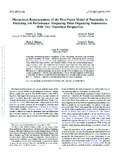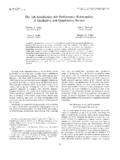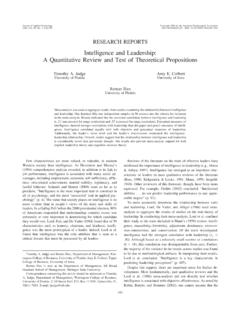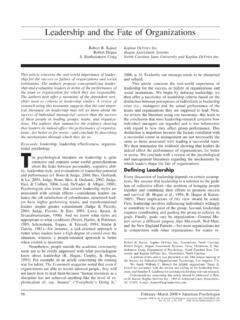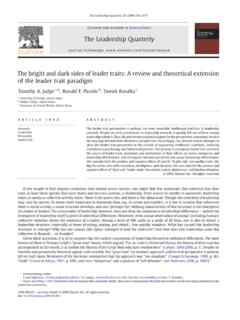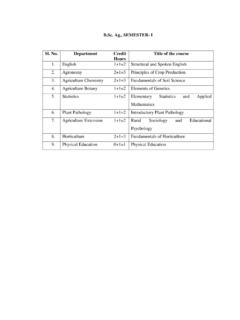Transcription of The Effect of Physical Height on Workplace Success …
1 The Effect of Physical Height on Workplace Success and Income:Preliminary Test of a Theoretical ModelTimothy A. JudgeUniversity of FloridaDaniel M. CableUniversity of North CarolinaIn this article, the authors propose a theoretical model of the relationship between Physical Height andcareer Success . We then test several linkages in the model based on a meta-analysis of the literature, withresults indicating that Physical Height is significantly related to measures of social esteem ( .41),leader emergence ( .24), and performance ( .18). Height was somewhat more strongly related tosuccess for men ( .29) than for women ( .21), although this difference was not significant.
2 Finally,given that almost no research has examined the relationship between individuals Physical Height andtheir incomes, we present four large-sample studies (totalN 8,590) showing that Height is positivelyrelated to income ( .26) after controlling for sex, age, and weight. Overall, this article presents themost comprehensive analysis of the relationship of Height to Workplace Success to date, and the resultssuggest that tall individuals have advantages in several important aspects of their careers and organiza-tional lives. Short people got no reason, to live. Randy Newman,Short People1 I feel as tall as you. Ellis Meredith, suffragistThere seems to be a societal impression that taller people aremore successful in life.
3 Although it is tempting to dismiss thisbelief as a folk tale, research suggests that some elements of lifeare easier for taller people because Height is a socially desirableasset (Roberts & Herman, 1986). For example, taller individualsare judged as being more persuasive (Young & French, 1996),more attractive as mates (Freedman, 1979; Harrison & Saeed,1977; Lerner & Moore, 1974), and more likely to emerge as aleader of other people (Higham & Carment, 1992; Stogdill, 1948).Indeed, on the latter point, not since 1896 have citizenselected a President whose Height was below average; WilliamMcKinley at 5 ft 7 in.
4 ( m) was ridiculed in the press as a littleboy .Theoretically, the importance of Height has evolutionary origins,because animals use Height as an index for power and strengthwhen making fight-or-flight decisions. As noted by Freedman(1979), Throughout nature the rule is the bigger, the more dan-gerous (p. 92). Thus, from a sociobiological perspective, heightequals power and therefore demands respect. Perhaps due to theclose linkage between Height and social power, there also appearsto be a psychology of stature whereby people s Height has far-reaching consequences on their dispositions, personalities, andbehaviors.
5 In fact, Alfred Adler coined the phraseNapoleon com-plexto describe cases when peoples short stature makes them feelinadequate, leading to an inferiority complex and the adoption ofoveraggressive behavior to compensate for lack of Height andpower (Adler, 1956; Martel & Biller, 1987). Height should be particularly relevant in the Workplace whereissues of persuasion and power take on special significance. Someevidence exists for this position, because many employers seem tobelieve that Height and Workplace Success are linked. For example,Kurtz (1969) found that the majority of recruiters (78%) believedthat salespersons of above average Height were more impressive tocustomers than shorter salespersons.
6 Lester and Sheehan (1980)found that supervisors expected short police officers to receivemore complaints, cause more disciplinary problems, and engenderpoorer morale than taller police officers. In the context of aca-demia, Hensley (1993) noted, The perception seems to exist thattaller individuals are somehow more capable, able, or competent (p. 40). Moreover, as suggested previously, some qualitative re-views have suggested positive relationships of Height with perfor-mance, leader effectiveness, and leader emergence (see Hensley &Cooper, 1987; Roberts & Herman, 1986).To develop the literature on Height and Workplace Success , thepresent study has three goals.
7 First, although some past researchhas suggested interesting linkages between Physical Height andmeasures of career Success , no conceptual model has been pro-posed to articulate why or how this linkage exists. Accordingly, wefirst address the atheoretical nature of the existing literature by1 The song brought Newman accusations of the very injustice he wassatirizing, and in Maryland it remains illegal for radio stations to air A. Judge, Department of Management, Warrington College ofBusiness, University of Florida; Daniel M. Cable, Kenan-Flagler BusinessSchool, University of North thank John D. Kammeyer-Mueller for his comments and insights onthe article and the theoretical concerning this article should be addressed to TimothyA.
8 Judge, Department of Management, Warrington College of Business,University of Florida, 211D Stuzin Hall, Box 117165, Gainesville, FL32611. E-mail: of Applied PsychologyCopyright 2004 by the American Psychological Association2004, Vol. 89, No. 3, 428 4410021-9010/04/$ DOI: a process model of the Height career , we conduct a meta-analysis of the Height Workplace suc-cess literature to test some of the general implications of theprocess model. There has not been a comprehensive attempt toassess the general trend of findings across the Height career suc-cess studies that have accumulated over the past 75 years.
9 Thus,research on Height and Workplace Success has been conducted inmany different methodological contexts across many differentoutcomes, and no attempt has been made to assess the robustnessof the effects across investigations. In addition to showing thegeneral strength and variability of relationships, a statistical ex-amination of past research is valuable because trends in researchare difficult to interpret qualitatively. For example, after reviewingboth positive and null relationships in their review of the literature,Roberts and Herman (1986) noted, The evidence to support orcontradict the existence of systematic prejudices against tall orshort individuals remains inconsistent (p.)
10 134).Finally, we conduct four new investigations of the relationshipbetween individuals Height and their personal incomes. Althoughincome is the most common index of career Success ( , Judge,Cable, Boudreau, & Bretz, 1995; Whitely, Dougherty, & Dreher,1991), almost no research has examined how Height affects incomelevels. If tall people are in greater demand and less supply thanaverage-sized people, then firms should be willing to pay more toget them. However, only three published articles have empiricallyexamined this hypothesis (Deck, 1968; Frieze, Olson, & Good,1990; Melamed, 1994); because participants in these existingstudies reported both their salaries and Height at the same time, itis possible that people exaggerated both their income and theirheight (Roberts & Herman, 1986).
